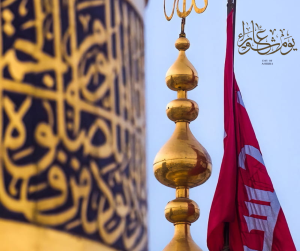
“Ashura” holds a profound significance as a day of solemn commemoration in Islam, an annual observance that falls on the 10th of Muharram, the first month of the Islamic calendar. Ashura, a significant holy day in the Muslim faith, holds a special place as it is observed on the 10th of Muḥarram, the first month of the Muslim calendar (the Gregorian date varies each year). The name ‘Ashura’ finds its roots in the Arabic word for ‘ten,’ symbolizing the day’s importance. Interestingly, the term ‘Muḥarram‘ itself originates from the Arabic root ḥ-r-m, which carries the meaning of ‘forbidden’ (haram).
Traditionally, Muḥarram was among the four sacred months during which fighting was strictly prohibited. Fasting on Ashura was widely practiced in early Islamic society, with even the revered Prophet Muhammad himself observing this fast. However, later in his life, Muhammad received a revelation that led to adjustments in the Islamic calendar. Consequently, Ramadan, the ninth month, took on the role of the designated month for fasting, leading to the removal of the obligation to fast on Ashura.
The evolution of this holy day reflects the dynamic nature of Islamic practices and teachings, signifying the importance of adapting and embracing changes while preserving the essence of faith.”
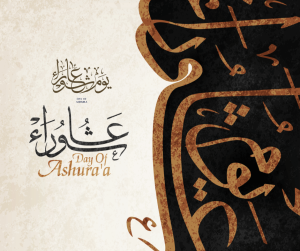
The Day of Ashura holds a profound and cherished place in the hearts of Muslims, irrespective of their Sunni or Shia beliefs, as it carries immense spiritual and historical significance.
For the majority of Sunni Muslims, this day is observed with great reverence, marked by fasting and engaging in special prayers at mosques. These acts of devotion serve to emphasize the day’s sacredness and foster a deeper connection with their faith.
Conversely, for Shia Muslims, Ashura is a solemn occasion filled with grief and mourning. It serves as a poignant reminder of the tragic events that unfolded during the Battle of Karbala, where Imam Hussein, the beloved grandson of Prophet Muhammad, suffered a heart-wrenching martyrdom. On this day, Shia Muslims reflect on the sacrifices made by Imam Hussein and his followers, exemplifying their devotion and loyalty to the principles of justice and righteousness.
Despite the differing practices, both Sunni and Shia Muslims share a common thread of reverence for Ashura, and it remains a day that unites the Islamic community in the remembrance of history’s poignant lessons and the pursuit of spiritual growth.
On this significant day, Shia communities come alive with vibrant and expressive rituals that vividly re-enact the historical events of the Battle of Karbala. Colorful plays take center stage, allowing devotees to passionately embody the roles of Imam Hussein and his loyal followers as they bravely confronted the Umayyad forces under the caliph, Yazid I.
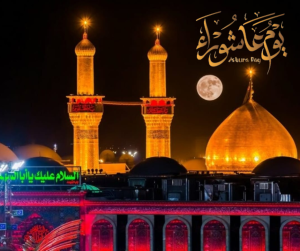
The Battle of Karbala, which occurred in 680 CE, holds immense importance in shaping the later division between Shia and Sunni Muslims. However, it’s crucial to recognize that this historical event unfolded long before the complete crystallization of religious differences between these two factions.
It’s interesting to note that Sunnis also hold great reverence for Imam Hussein, and many of them share a negative view of Yazid, who is often criticized for his impiety. While some Sunnis do participate in mourning ceremonies for Hussein, especially those following Sufi traditions, their observances are generally less intense compared to their Shia counterparts.
One contentious aspect of the Shia mourning for Hussein is the practice of self-flagellation, known as tatbir. While some prominent Shia Islamic jurists, including the late Iranian leader Ayatollah Khomeini, have condemned this practice or deemed it redundant in the modern era, a minority of religious figures continue to emphasize its significance, usually with the caveat that no harm should befall those engaging in the ritual.

Intriguingly, Middle East Eye provides a closer examination of this day and how it is honored by Muslims, shedding light on the rich tapestry of traditions and beliefs that mark this solemn and deeply meaningful occasion.
What is Ashura? Ashura is a momentous day of deep significance for Muslims, carrying different meanings for Sunni and Shia communities.
For Muslims, Ashura commemorates a historical event when God delivered the Israelites, led by the esteemed Prophet Musa (Moses), from the oppressive rule of Egypt’s Pharaoh. The divine intervention, symbolized by the parting of the Red Sea, enabled the Israelites to cross safely, freeing them from tyranny.
In Sunni communities, Ashura is observed with solemnity, involving a day of fasting and engaging in religious ceremonies that include sermons and communal meals. It serves as an occasion for reflection and gratitude for God’s deliverance and mercy.
On the other hand, for Shia Muslims, Ashura holds a profound significance as it marks the anniversary of the death of Imam Hussein, who is revered as an esteemed leader (Imam) of the Muslim community. Within Twelver Shia Islam, there is recognition of twelve successors of Prophet Muhammad, all descending from him through his daughter Fatima and son-in-law Ali, who is the first Imam. Imam Hussein, being the third in this line, played a pivotal role in attempting to attain leadership of the Muslim community from the Umayyads under Yazid.
Tragically, the Battle of Karbala, a fierce and bloody confrontation near the Euphrates River in present-day Iraq, marked the climax of Hussein’s endeavors, leading to the martyrdom of him and many of his devoted followers. For Shia Muslims, Hussein’s sacrifice represents the ultimate price paid in the pursuit of justice and righteousness, and thus, he is mourned to this day at his shrine in Karbala, as well as in mourning ceremonies observed across the Muslim world.
The lineage of Imams continues through Hussein’s surviving son, also named Ali. However, for Twelver Shia Muslims, the line of Imams ends with the twelfth Imam, Muhammad al-Mahdi, who, according to Shia tradition, entered a state of occultation and will return to precipitate the Day of Judgment.
In summary, Ashura holds multifaceted meanings for Muslims, with Sunni communities commemorating the deliverance of the Israelites, and Shia Muslims venerating Imam Hussein’s martyrdom as a symbol of unwavering commitment to justice and righteousness. This day serves as a reminder of faith, devotion, and the pursuit of higher ideals within the diverse tapestry of Islamic beliefs and practices.
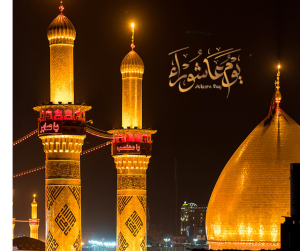
When is Ashura?
Ashura holds immense significance as a remarkable day observed on the tenth of Muharram, the first month in the Islamic lunar calendar, considered to be one of the holiest months in Islam. As the Islamic calendar follows the lunar cycle, the specific date for Ashura on the Gregorian calendar fluctuates, falling either on the 27th or 28th of July. The determination depends on the method of moon sighting employed to commence the month of Muharram.
Why is it called Ashura?
The name “Ashura” derives from the Arabic word for “ten,” reflecting its close association with the tenth day of Muharram. Additionally, the term “Muharram” itself originates from the Arabic word “haram,” meaning “forbidden.” Within Islamic tradition, Muharram holds a sacred status, known as one of the months during which warfare was prohibited.
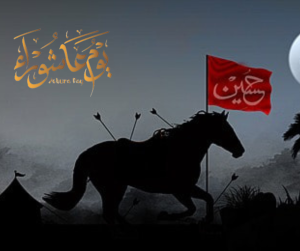
What is the religious significance?
Fasting on the day of Ashura holds immense religious significance for Muslims, as they believe it serves as an opportunity for God to forgive their sins from the preceding year. This practice is rooted in the Quran, where it recounts how God commanded Prophet Moses to strike the sea with his staff, miraculously parting it and saving the Israelites from the tyranny of Pharaoh. In gratitude for this divine mercy, Moses commenced fasting on Ashura as a heartfelt act of worship.
The Prophet Muhammad further emphasized the importance of Ashura by encouraging Muslims to fast not only on the tenth day but also on the ninth of Muharram. This distinction in fasting aimed to distinguish Muslims from adherents of other faiths. Although fasting on Ashura and the ninth day is optional, many devout Muslims choose to observe this practice, embracing it as a means to draw closer to God and express their devotion and gratitude.
In essence, Ashura represents a time for profound spiritual reflection, self-restraint, and a profound connection with God’s mercy. It enables Muslims to seek forgiveness and purification while commemorating the historical events that have shaped this momentous day. It stands as a reminder of faith’s enduring power and the unwavering commitment of Muslims to their beliefs.
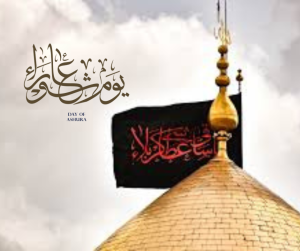
How is it marked by Shia Muslims?
Ashura holds profound significance for Shia Muslims, and they commemorate this day in various meaningful ways. Shia preachers play a crucial role during Ashura, delivering heartfelt sermons that recount the historical events of the Battle of Karbala. They vividly depict the life of Imam Hussein, emphasizing his noble virtues and unwavering principles.
In Iraq and Iran, among other places, large public gatherings come together to mourn and honor the memory of Imam Hussein. These gatherings feature emotionally charged plays, marches, and processions, drawing thousands of people who collectively pay their respects to the revered Imam.
The powerful “passion plays” presented during these events serve to highlight the profound significance of Imam Hussein’s ultimate sacrifice, evoking deep emotional fervor among the participants and reminding them of the importance of pursuing justice.
One controversial practice that some Shia Muslims engage in during Ashura is tatbir, where they use blades, chains, or other items to beat themselves symbolically. This act is seen as a representation of sacrifice and struggle. However, it is essential to note that this practice is banned in some countries and frowned upon by many clerics. As an alternative, some devotees choose to mourn by engaging in charitable acts, such as donating blood, to honor the memory of Imam Hussein.
Throughout the period of Muharram, the month of Ashura, Shia worshippers commonly wear black clothing as a symbol of mourning and sadness. This outward expression of grief serves as a reminder of the profound impact of Imam Hussein’s sacrifice and the enduring lessons his life imparts.
In summary, Ashura is marked by Shia Muslims with reverence, remembrance, and emotional devotion. Through sermons, plays, processions, and acts of mourning, they honor Imam Hussein’s legacy and draw inspiration from his life’s teachings. The commemoration of Ashura remains a poignant reminder of the enduring values of justice, sacrifice, and compassion that continue to resonate in the hearts of Shia communities around the world
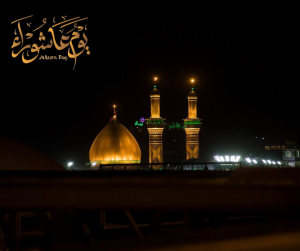
FAQs
1. What is Ashura?
Ashura is a significant day in the Islamic calendar, observed on the tenth day of Muharram, the first month of the lunar year. Ashura holds profound significance, encompassing both spiritual and historical importance cherished by Muslims around the world.
2. Why is Ashura important for Muslims?
Ashura carries multiple layers of significance. For Sunni Muslims, Ashura stands as a significant day when they commemorate the divine deliverance of the Israelites, led by the esteemed Prophet Musa (Moses), from the oppressive rule of Pharaoh through the miraculous parting of the Red Sea. For Shia Muslims, it commemorates the martyrdom of Imam Hussein, the grandson of Prophet Muhammad, during the Battle of Karbala.
3. How do Sunni Muslims observe Ashura?
Sunni Muslims observe Ashura with fasting and engaging in religious ceremonies, including special prayers in mosques. This day provides an opportunity for spiritual reflection and gratitude for God’s mercy and deliverance.
4. How do Shia Muslims commemorate Ashura?
Shia Muslims commemorate Ashura with deep mourning and sorrow. Preachers deliver sermons recounting the events of the Battle of Karbala, highlighting Imam Hussein’s virtues. Large public gatherings, plays, and processions are held, evoking emotional fervor and emphasizing the pursuit of justice.
5. What are the “passion plays” during Ashura?
The “passion plays” are theatrical performances that depict the events of the Battle of Karbala and Imam Hussein’s sacrifice. These plays aim to create emotional connections and emphasize the importance of standing for justice and righteousness.
6. Is takbir practiced during Ashura?
Takbir is a controversial practice among some Shia Muslims during Ashura. It involves self-flagellation with blades, chains, or other items as a symbol of sacrifice and struggle. However, many clerics disapprove of this practice, and some worshippers opt for alternative ways of mourning, like charitable acts.
7. Why do Shia Muslims wear black during Ashura?
During Ashura, Shia Muslims often wear black clothing as a symbol of mourning and sadness for the martyrdom of Imam Hussein. It serves as a visual expression of grief and a reminder of his noble sacrifice.
8. Is fasting on Ashura obligatory for all Muslims?
Fasting on Ashura is not obligatory for all Muslims. While it is a recommended practice, both Sunni and Shia Muslims have the option to fast on this day as an act of devotion and gratitude.
9. What lessons can Muslims derive from Ashura?
Ashura teaches Muslims valuable lessons about courage, sacrifice, and unwavering commitment to justice and righteousness. It serves as a reminder of the enduring values that resonate within the Islamic faith.
10. How can non-Muslims show respect during Ashura?
Non-Muslims can show respect during Ashura by being understanding and considerate of the significance of this day for Muslims. Observing their practices with respect and avoiding any insensitive behavior or remarks is a thoughtful way to show support and solidarity.
